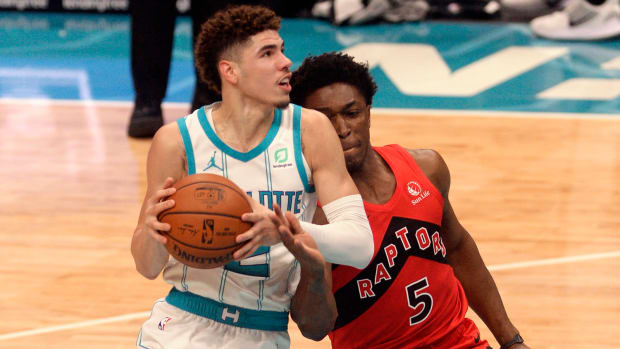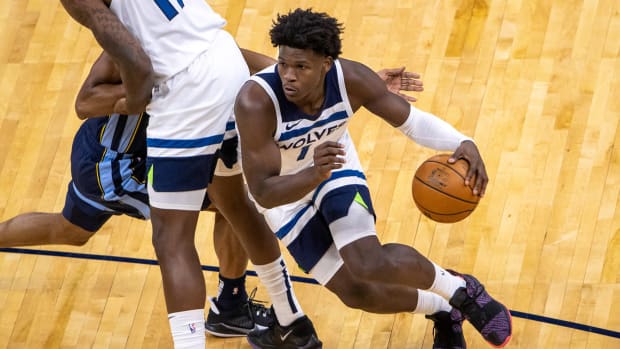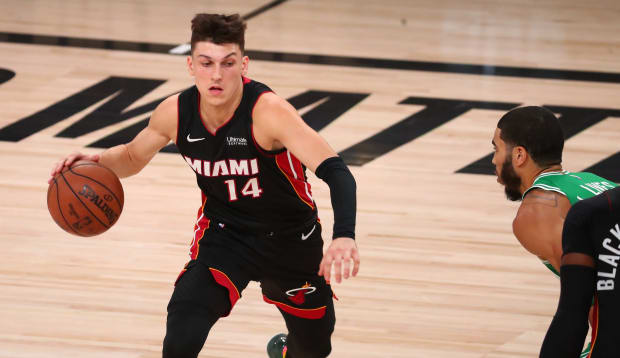Which young players could crack Sports Illustrated's Top 100 NBA player rankings for years to come?
Designating an official “watch list” of talented young players is an arbitrary task unto itself. Assessing long-term potential is an imperfect task, and there’s always an abundance of intriguing prospects dotting NBA rosters. Since we’re doing this, the buck has to stop somewhere. So we’ve decided to limit this list to 12 players who for one reason or another most deserve your attention this season.
In determining which players fell onto this watch list and which fell to the list of legitimate snubs, I drew some lines based on age and performance sample. For example, bubble darlings Michael Porter Jr. and Tyler Herro appear below: Both have the talent to justify sneaking onto the list, but neither has played at that level for a full NBA season, and patience is permissible. On the other hand, players like Brandon Clarke and Gary Trent Jr.—who offer a bit more reliability as role players based on their skill sets—were listed as snubs. It’s not a perfect system, nor is it a massively important distinction. In the case of returners, I gave a bit more credence to how players performed last season, relative to the more nebulous debate over upside, which led to the omission of sophomores like RJ Barrett and Cam Reddish.
With a nod to our predecessors Ben Golliver and Rob Mahoney, rookies have never been ranked on the Top 100 list, and we held to that (and from my perspective, none of this year’s draftees would have warranted legit consideration anyway). Six of them made our list, based largely on my own evaluation of their abilities and the likelihood they actually contribute this season. Again, it’s not perfect.
On that note, here are our 12 players to watch, listed alphabetically, all with more to prove.

LaMelo Ball, Charlotte Hornets
Certainly, Ball’s reputation precedes him, and his rookie season is sure to be covered with a predictable level of online zeal, but he’s an intriguing, gifted player in his own right. He already passes the ball on par with many of the NBA’s best, but his feel for making decisions needs some work. If the Hornets rely on him for major minutes and in crunch time, they probably aren’t going to win much. But this first season will be more about how quickly Ball picks up the learning curve—and the growth of his jump shot—than the wins and losses.
Bol Bol, Denver Nuggets
Who knows what to make of Bol Bol? The jury is very much out, and he’s still something of a curiosity, but if the 7’2” forward can break into the Nuggets’ rotation, he’s going to be a fascinating watch. Due to Bol’s slender frame, Denver views him as more of a wing than a big and will play him accordingly, but his shot-blocking acumen and unusual ball skills give him a chance to be a unique piece in due time. It’s just that nobody is sure exactly what that looks like yet.
Donte DiVincenzo, Milwaukee Bucks
After nearly being traded to the Kings, DiVincenzo returns to build on a solid sophomore campaign with the Bucks, where he should take on a larger role and potentially start. The 23-year-old is a heady, athletic defender who stands to improve as a shooter and playmaker but understands how to fit in and does so with no complaint. Milwaukee will benefit greatly if he makes a leap, and more minutes are headed his way.
Luguentz Dort, Oklahoma City Thunder
Dort earns a spot on this list based primarily on his memorable bubble performance, where he stepped up defensively on James Harden to the point the Rockets had to alter their game plan to win that series. He’s still extremely raw, but the Thunder are going to be patient with him as they rebuild. Any steps Dort can take in any facet of his offensive skill set would go a long way in building his long-term value and making his minutes more viable than just situational deployment.

Anthony Edwards, Minnesota Timberwolves
Edwards was the No. 1 pick in the 2020 draft, but expectations should be a bit more tempered than usual for a player still learning exactly who he is, and what it takes to win games. But he has all the tools to become one of the league’s best scorers, and this first season should be gauged more on consistency and his defensive progress. Minnesota’s abundance of guards and scorers should make his life easier. It’s on Edwards to make the most of the situation.
Tyrese Haliburton, Sacramento Kings
A unique playmaking presence who continues to improve at a high rate, Haliburton warrants attention thanks to his ideal fit on the Kings, and his ability to accentuate talent around him. The No. 12 pick in the draft has a chance to develop into one of the NBA’s most unusual role players as he gets stronger and improves his handle. It’s hard to know exactly what to expect out of the gate, but Haliburton could legitimately be a piece that can help turn things around in Sacramento.
Killian Hayes, Detroit Pistons
It looks like Hayes, the No. 7 pick, will take the reins as Detroit’s starter right away, and he’s the player the Pistons are staking their long-term hopes to for the time being. He may not set the world on fire, but his playmaking skills and feel for the game point to long-term growth potential, and he’ll be afforded a lot of patience as he adjusts from playing in Germany last season. We’ll see how much he can do when thrown into the mix early, but his future is bright.

Tyler Herro, Miami Heat
Herro was arguably the breakout star in the Orlando bubble, and for good reason, helping the Heat make the Finals, draining big shot after big shot, and generally earning his stripes. Still, history has shown it’s probably better to wait than to judge him off a hot month and rank him rashly. Herro’s ability to create his own shot points to tantalizing upside, but the other elements of his game remain a work in progress.
Michael Porter Jr., Denver Nuggets
Finally healthy and having broken into the Nuggets’ rotation, Porter flashed game-changing ability as a scorer in the bubble, and appears on track to make good on his considerable talent. But the weaknesses in his game—a lack of general defensive awareness, limited passing skills and a still-improving ability to make good decisions—are ultimately too critical to dismiss. He could be one of the league’s best scorers if he puts it all together. There’s just a lot left for Porter to learn.
Obi Toppin, New York Knicks
Assuming the Knicks hand Toppin a lot of playing time, he should be among the Rookie of the Year frontrunners. He’s an older, savvier prospect than his peers and bears a more polished offensive skill set. Toppin can space the floor and drive to the rim, and he racked up numbers in a versatile role at Dayton. His defense is another question, but New York is betting big on his long-term growth.
P.J. Washington, Charlotte Hornets
Washington quietly had a nice rookie season in Charlotte, proving capable of scoring inside and out, contributing on defense and taking on a starting role immediately. He has the quintessential skill set for a small-ball big and should benefit from an influx of playmakers on the roster to help him find easier shots. He may never pop like an All-Star, but he’s rock solid in ways that point toward a meaningful career.
James Wiseman, Golden State Warriors
We’ll see how quickly the Warriors hand Wiseman major minutes as they vie to return to the playoffs with a healthy Steph Curry, but there’s not much stopping him from becoming a double-double threat and potential stretch big in relatively short order. The fit with the up-tempo Dubs makes a lot of sense. He should have more space than ever to operate and elite playmakers to help feed him easy baskets. He hasn’t played organized hoops in more than a year, but the No. 2 pick is a major piece of Golden State’s future, and potentially its present.